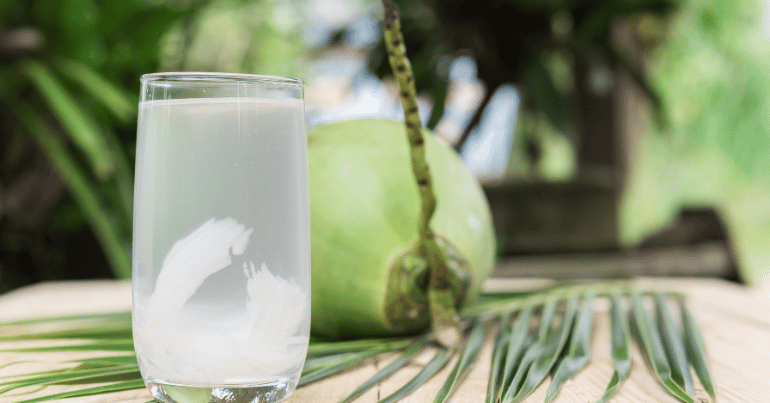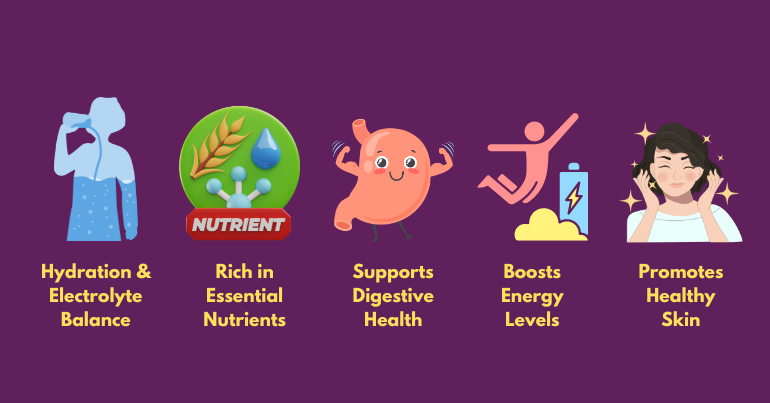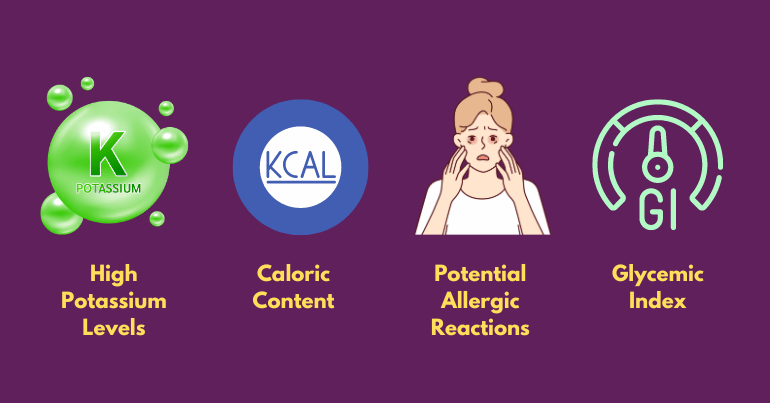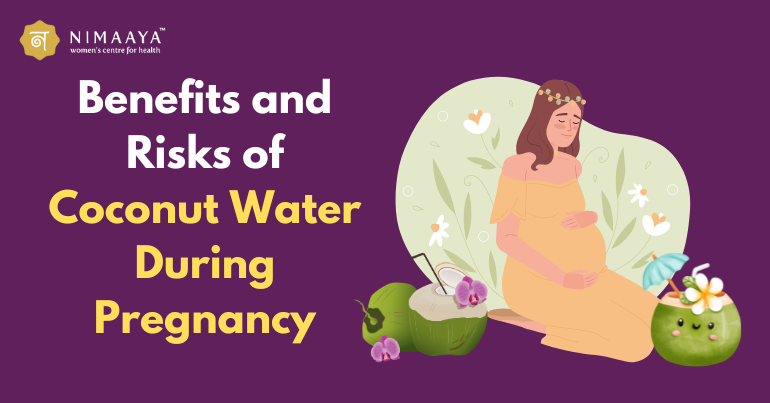Introduction
Pregnancy is a transformative journey filled with excitement, anticipation, and a multitude of questions about what is best for both mother and baby. Among the myriads of dietary considerations, one that stands out for its increasing popularity is coconut water. Often hailed as a natural elixir, coconut water is praised for its hydrating properties and nutritional benefits. But what are the true benefits and potential risks of consuming coconut water during pregnancy? This comprehensive guide explores the intricacies of coconut water during pregnancy, providing you with the knowledge to make informed decisions about including this tropical drink in your diet.
Understanding Coconut Water

Before diving into the benefits and risks, it’s helpful to understand what coconut water actually is. The transparent liquid within young, green coconuts is called coconut water. It is different from coconut milk, which is made by blending grated coconut flesh with water. Rich in essential nutrients, coconut water has been used traditionally in various cultures for its hydrating properties and health benefits. Coconut water, often dubbed “nature’s sports drink,” is the clear liquid found inside young green coconuts. It’s lauded for its refreshing taste and rich nutrient profile, making it a tempting choice for pregnant women looking to supplement their fluid intake naturally.
Also Read: Filtering the Top 5 IVF Centers in Vadodara for Successful IVF Journey
Potential Benefits and Risks of Coconut Water During Pregnancy
The Benefits of Coconut Water – (प्रेगनेंसी में नारियल पानी पीने के फायदे)

1. Hydration and Electrolyte Balance
One of the most significant benefits of coconut water during pregnancy is its ability to keep you hydrated. Pregnancy can increase your body’s need for fluids, and coconut water offers a natural and effective way to meet this demand. Rich in electrolytes like potassium, sodium, and magnesium, coconut water helps maintain proper fluid balance in your body, which is crucial for both maternal health and fetal development.
Electrolytes are vital for maintaining fluid balance, muscle function, and nerve function. During pregnancy, your body’s requirements for these electrolytes increase, making coconut water an excellent addition to your diet.
2. Rich in Essential Nutrients
Coconut water is not just hydrating but also packed with essential nutrients. It contains vitamins like Vitamin C, which supports your immune system and promotes healthy skin, and B vitamins which are important for energy production and overall health. Additionally, it provides minerals such as calcium and phosphorus, which support bone health for both you and your developing baby.
Incorporating coconut water into your pregnancy diet can help you meet some of these increased nutritional needs in a natural and delicious way.
3. Supports Digestive Health
Pregnancy can bring about various digestive issues, including constipation and bloating. Coconut water is a natural diuretic and can help alleviate these symptoms by promoting healthy digestion and bowel movements. The high potassium content in coconut water also aids in reducing bloating and gas, which can be common discomforts during pregnancy. A regular intake of coconut water might help keep your digestive system running smoothly, offering a natural remedy to some of the digestive challenges of pregnancy.
4. Boosts Energy Levels
Feeling fatigued during pregnancy is not unusual, especially as your body works hard to support the growth of your baby. Coconut water can provide a natural energy boost without the added sugars or artificial ingredients found in many other beverages. Its combination of natural sugars, vitamins, and minerals helps replenish energy levels and keeps you feeling refreshed throughout the day. Opting for coconut water over sugary drinks can be a healthier way to maintain your energy levels during pregnancy.
5. Promotes Healthy Skin
Pregnancy often leads to changes in skin texture and appearance, with some women experiencing dryness or breakouts. The hydrating properties of coconut water can help keep your skin moisturized and supple. Additionally, the antioxidants present in coconut water combat free radicals, which can help maintain a healthy and radiant complexion. By drinking coconut water, you may find that your skin looks and feels better throughout your pregnancy.
6. Helps Maintain Healthy Blood Pressure
Maintaining healthy blood pressure levels is important during pregnancy to support both your health and your baby’s development. Coconut water contains potassium, which helps regulate blood pressure by balancing sodium levels in the body. This can be particularly beneficial for pregnant women who are at risk of developing hypertension.
7. Potential for Contamination
Natural coconut water can sometimes be contaminated with harmful bacteria or chemicals, especially if not sourced from reputable suppliers. It’s important to choose high-quality, pasteurized coconut water to minimize the risk of contamination.
Side Effects and Risks of Coconut Water

1. High Potassium Levels
While potassium is an essential nutrient, too much of it can cause problems. Coconut water contains a significant amount of potassium, and excessive intake can lead to hyperkalemia, a condition where potassium levels in the blood become too high. Symptoms of hyperkalemia can include nausea, fatigue, and irregular heart rhythms. To avoid this risk, it is important to consume coconut water in moderation and consult with a healthcare provider to ensure it fits within your dietary needs.
2. Caloric Content
Though coconut water is low in calories compared to other beverages, it does contain natural sugars that contribute to its caloric content. Excessive consumption of coconut water could lead to weight gain if not balanced with a well-rounded diet and physical activity. Moderation is key to ensure that the calories from coconut water do not interfere with your overall caloric intake during pregnancy.
3. Potential Allergic Reactions
While rare, some individuals may experience allergic reactions to coconut water. Symptoms can range from mild skin rashes to more severe reactions such as itching and swelling. If you have a known allergy to coconut or other similar foods, it is crucial to avoid coconut water and discuss alternatives with your healthcare provider.
There is a chance that some people have an allergy to coconut water. An allergic reaction may cause swelling, itching, or breathing difficulties. If you experience any of these symptoms after consuming coconut water, you should stop drinking it and consult a healthcare provider.
4. Glycemic Index
Coconut water has a moderate glycemic index, which means it can raise blood sugar levels more than water but less than sugary drinks. If you have gestational diabetes or are at risk of it, you should monitor your blood sugar levels and discuss with your doctor the appropriate amount of coconut water for you.
Understanding both the benefits and side effects of coconut water during pregnancy can help you make informed dietary choices. While the benefits of coconut water during pregnancy include hydration, nutrient enrichment, and digestive support, it’s also important to be aware of potential risks such as high potassium levels and possible allergic reactions. By balancing these factors and consuming coconut water in moderation, you can enjoy its advantages while safeguarding your health and that of your baby. For personalized advice, always consult with a healthcare provider to address your specific needs and conditions.
How to Include Coconut Water in Your Diet While Pregnant?
Incorporating coconut water into your diet can be both simple and enjoyable. Here are a few tips on how to do so effectively:
Choose Natural Coconut Water:
Opt for fresh, natural coconut water in pregnancy, without added sugars or artificial flavors. Look for brands that offer pure coconut water or, even better, drink directly from a young coconut. Opt for fresh coconut water when possible, as it is free from preservatives and added sugars. If you choose packaged coconut water, look for options with no added sugars or artificial ingredients.
Moderation is Key:
Enjoy coconut water in moderation, aiming for one to two servings a day. This will allow you to reap the benefits without overloading with calories or potassium.
Pair it with a Balanced Diet:
Use coconut water as a part of a balanced diet that includes a variety of fruits, vegetables, proteins, and whole grains to ensure you’re meeting all your nutritional needs.
Smoothies:
Add coconut water to your smoothies for an extra boost of hydration and nutrients.
Hydrating Drink:
Drink coconut water on its own as a refreshing and hydrating beverage.
Cooking and Baking:
Use coconut water as a liquid in cooking or baking for added flavor and nutrition.
Coconut Water During Pregnancy: Separating Myths from Facts
Myth 1: Coconut Water Can Cure Morning Sickness
Fact: While coconut water is hydrating and contains essential nutrients, it is not a cure for morning sickness. Morning sickness is a common pregnancy symptom that can be managed with a balanced diet, hydration, and advice from your healthcare provider.
Myth 2: Drinking Coconut Water Will Make Your Baby Fairer
Fact: There is no scientific evidence to support the idea that coconut water affects the skin color of your baby. A baby’s skin tone is determined by genetics, not by what you consume during pregnancy.
Myth 3: Coconut Water Can Replace Prenatal Vitamins
Fact: Coconut water is nutritious but does not contain all the essential vitamins and minerals required during pregnancy. Prenatal vitamins are specifically formulated to meet the nutritional needs of both the mother and the baby.
Myth 4: Drinking Coconut Water Can Prevent Stretch Marks
Fact: While coconut water is hydrating and contains antioxidants, there is no scientific proof that it can prevent stretch marks. Stretch marks are largely influenced by genetics and skin elasticity.
Myth 5: Coconut Water Can Reduce Labor Pain
Fact: There is no evidence to suggest that coconut water has any impact on labor pain. Pain management during labor should be discussed with your healthcare provider, who can offer various methods for relief.
Myth 6: Coconut Water Is a Safe Hydration Option for Pregnant Women
Fact: Coconut water is indeed a good hydration option during pregnancy. It is low in calories and rich in electrolytes. It should be included in a balanced diet and taken in moderation, though.
These myths and facts help clarify how coconut water can fit into a healthy pregnancy diet and where it falls short of some of the claims made about its benefits.
Expert Opinions and Recommendations on Coconut Water During Pregnancy
Experts agree that coconut water can be a beneficial addition to a pregnancy diet, thanks to its hydrating properties and essential nutrients. According to the specialists at Nimaaya IVF Center and the best gynecologist in Vadodara, coconut water offers valuable electrolytes and vitamins that support maternal health and hydration. However, they also emphasize the importance of moderation due to the high potassium content and potential for allergic reactions. Consulting with a healthcare professional ensures that you can safely incorporate coconut water into your diet while addressing your unique nutritional needs and maintaining a balanced pregnancy diet.
Conclusion:-
Coconut water during pregnancy can be a refreshing and nutritious addition to a pregnant woman’s diet. Its benefits, including hydration, nutrient supply, and alleviation of common pregnancy discomforts, make it a popular choice. However, it’s essential to be aware of the potential risks and consume it in moderation. Consulting with healthcare providers at the Nimaaya IVF Center like Dr. Yuvrajsingh Jadeja and one of the best gynecologists in Vadodara can offer personalized guidance and ensure a healthy pregnancy journey.
By understanding the benefits and risks of coconut water during pregnancy, expecting mothers can make informed decisions that contribute to their well-being and that of their developing baby. Whether it’s a refreshing drink on a hot day or a natural remedy for morning sickness, coconut water can play a supportive role in a balanced and healthy pregnancy diet.
-:FAQs:-
1) Can I use coconut water in cooking or baking while pregnant?
Absolutely! Coconut water can be used in cooking and baking to add flavor and nutrients. Just ensure you’re using it as part of a well-rounded diet and not relying on it as your sole source of hydration.
2) What are the best times to drink coconut water during pregnancy?
You can drink coconut water at any time of the day, but it’s especially beneficial when you need a hydration boost or feel fatigued. Many women find it refreshing as a mid-morning or mid-afternoon drink.
3) How much coconut water can I drink each day while pregnant?
Moderation is key. It’s recommended to enjoy one to two servings of coconut water a day. This amount helps you reap its benefits without overloading on calories or potassium.
4) Can coconut water replace my prenatal vitamins during pregnancy?
No, coconut water cannot replace prenatal vitamins. While it is nutritious, it doesn’t contain all the essential vitamins and minerals you need during pregnancy. As directed by your healthcare professional, keep taking your prenatal vitamins.
5) Is it true that coconut water can prevent stretch marks during pregnancy?
No, coconut water cannot prevent stretch marks. Stretch marks are largely influenced by genetics and skin elasticity, so there is no beverage that can guarantee prevention.
6) How does coconut water compare to other hydrating beverages during pregnancy?
Coconut water is a great natural hydrating option due to its electrolyte content and low-calorie count. It’s a healthier choice compared to sugary drinks or sodas but should still be part of a varied and balanced diet.
7) Can coconut water improve skin health during pregnancy?
Coconut water can help keep your skin hydrated and may contribute to a healthy complexion due to its vitamins and antioxidants. However, it’s not a cure for pregnancy-related skin changes like dryness or breakouts.
8) can pregnant women drink coconut water?
Yes, pregnant women can drink coconut water as it is hydrating and nutritious, but it should be consumed in moderation.






